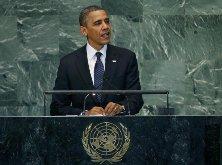 0 vote(s)
0 vote(s)
Global discussion on blasphemy will doubtless rollon, after US President Barrack Obama declared that the “Innocence of Muslims” a form of “freedom of speech”, in a statement that directly contradicted President Susilo Bambang Yudhoyono’s view on the same issue.
Obama, the second head of state to address the first day of the General Debate session of the UN 67th general assembly after Brazilian President Dilma Vana Rousseff, claimed that the video was “crude and disgusting” and “sparked outrage throughout the Muslim world.”
“Now, I have made it clear that the United States government had nothing to do with this video. It is an insult not only to Muslims, but to America as well,” Obama went on, in a move to ease global rage at his country as part of the fallout of the circulation of the video.
Two weeks ago, US Ambassador to Libya John Christopher Stevens and three other US Department of State employees were killed during an assault on the US consulate in Benghazi, Libya by an angry mob in a protest at the video, which the Muslim world has said is ridiculing Prophet Muhammad.
Despite acknowledgement that conflicts and violence may appear as a result of a publication of such “blasphemy”, Obama said the US could not ban such a video.
Why? “The answer is enshrined in our laws: Our Constitution protects the right to practice free speech. In the US, countless publications provoke offense. As the President of our country, I accept that people are going to call me awful things every day and I will always defend their right to do so,” Obama said, which came to the laughter of the audience.
Obama’s remarks contradicted the view of Yudhoyono, who, addressed the assembly about two hours after Obama’s speech.
Yudhoyono boasted Indonesia’s diversity of culture and religions, hence, it called for mutual respect and understanding among people of different faiths.
The President called on all UN member states to adopt an international instrument to prevent such a “blasphemous act” from reoccurring, because, “although initiatives undertaken by states at the UN and other forums, the defamation of religions persists.”
Yudhoyono said that the video, which he called another “ugly face” of defamation of religions, could not be served as a form of freedom of expression like Obama had said.
“The Universal Declaration of Human Rights underlines that in exercising their freedom of expression, everyone must observe morality and public order. Freedom of expression is therefore not absolute,” Yudhoyono argued.
But Obama said he understood the stance of Indonesia and many other countries.
“I know that not all countries in this body share this particular understanding of the protection of free speech. We recognize that. But in 2012, at a time when anyone with a cell phone can spread offensive views around the world with the click of a button, the notion that we can control the flow of information is obsolete. The question, then, is how do we respond?” Obama said in a defense to his previous argument.
